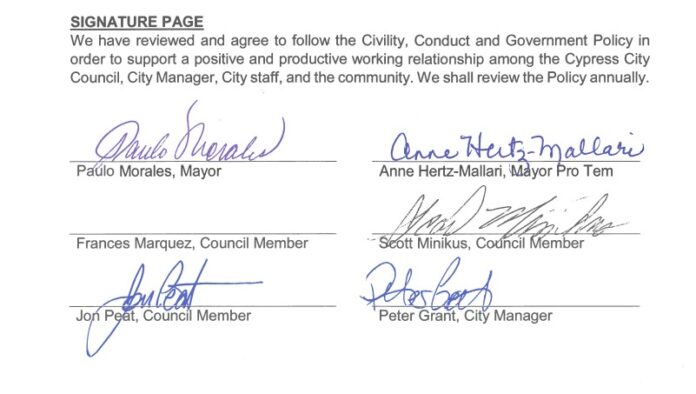By yet another vote of 4-1, the Cypress City Council formally adopted a 13-page Civility, Conduct and Governance Policy on March 14 that governs their public meetings’ “Rules of Order” and also sets the standards for citizens attempting to bring their concerns to the Council.
The civility document was drafted by City Manager Peter Grant and Fred Galante, the city’s legal counsel, and with the vote, has now become part of the city’s policy code.
Grant said during the meeting that the new policy was similar to a civility code previously adopted by the city, but that has not been updated since 1965. The city claims the new rules will promote “positive and productive working relationships.”
This update follows a tumultuous series of meetings in which Council member Frances Marquez has questioned the city’s policies, contractual process and other internal operational issues that she claims has left Grant and other members of the Council singling her out for harsh treatment and “bullying.”
Grant said the new rules are simply to retain decorum in the meetings.
Marquez contends the 13-page document is simply another attempt to “mute my voice.”
Two months ago, the city asked Galante to recite a 30-minute meeting protocol session wherein new ground rules for meetings were explained. Council members must go through a process before being able to simply put an item on the city agenda for debate.
This past week, since there was no new business, the Council spent most of the meeting dispensing routine items and after being pulled from the consent calendar by Marquez, discussing their proposed internal rules of order and governance policy.
The detailed “Civility, Conduct and Governance” policy is meant to compel Council members to govern using a set of rules determined by the city. They claim it is standard work for municipal governments.
While the document does cover items that promote decorum, there are some new rules with punitive consequences that Marquez, and others have complained are generic, general and can be used unquestioned by whomever is making the rules.
For instance, Council members, and perhaps other city officials, must:
• Refrain from inappropriate behavior and derogatory comments.
• Be accountable and responsible for their actions and words, even when it is uncomfortable to do so.
• Explain disagreement in a way that focuses on the merits of an issues moving forward.
• Be clear in presenting personal views and make it clear that those views may not represent the city’s position.
• May not commit the city to an action or position without the city council or city manager’s approval.
• Alert the city manager or city attorney in advance when asking questions.
• Majority shall show respect for the opinion of the minority.
• Support the city manager’s efforts to implement city council’s decisions.
The full document is on display at the city’s website, www.cypressca.org.
More interesting, the code allows the council to “discipline” individual members for violations of the code, apparently without clear standards of what constitutes infractions.
For example, an assumption, if a majority of council members find that another council member has violated the code, using some unpublished standard, by demonstrating “inappropriate behavior,” there are five levels of discipline now included in the city’s code as punishment, with censure being the harshest and a “direction to correct” being the first of the five steps.
Also included in the document, but less discussed, is a new standard of conduct for city taxpayers, who will be allowed to comment, but must now abide by the new guidelines, written in a special section, for oral communications.
Make no mistake, however, the new code makes it clear the city council meetings “is not the time for a dialogue between the City Council and the public.”
Following the back and forth during the process of approving the new code, Galante acknowledged that while the new policy will become part of the city’s code, it will not have the force of state law.
Therefore, while the document provides rules for disciplining those found in violation of the now approved CCG code, no legal charges can result.
The new document has already been signed by four of the five members, the four who approved it, and Marquez has consistently said she will not sign it.
“I believe it [the updated code] violates my freedom of speech and that of my constituents. I want my constituents to be able to speak freely, and openly everything they need to say,” she said. She continued, “I want them to be able to feel welcome to come in and tell me their upset with me, I don’t have a problem with that.”
“I think it is important for them to share their views and for us to listen,” said Marquez.
“The rules are there for everyone to be heard,” said Mayor Paulo Morales. “We want to hear differences of opinion,” he said, “we are not here to silence anyone or take away their freedom of speech.”
“It is simply that we respect the rights of everyone to speak,” he said, “and all we’re trying to do is keep decorum in the meeting. No one here is being limited, I don’t see that anywhere,” the mayor said.
Following the vote, and during the closing comment period allowed each member of the Council, Mayor Pro-tem Anne Hertz Mallari put pressure on Marquez to agree to sign the civility code.
“I know that we were given a deadline after we adopted this Civility, Conduct, and Governance Policy and the code of ethics,” said Hertz-Mallari. And we were all supposed to sign it by March 8. Are we all up to date on that,” she asked aloud?
“The council did require its members to sign the policy,” said Grant, “but Councilmember Marquez has not signed it.”
“Okay, I guess that’s not surprising,” said Hertz-Mallari, “in light of the lack of support of the ordinance which we adopted, I’m disappointed that the ultimate result [the new code] is not something Councilmember Marquez wants to support,” she said to a sudden, and deafening silence in the room.
Marquez finally broke the silence.
“I had originally said in the last meeting that, you know, after I had been yelled at [by Council member Jon Peat] that I wanted that [civility code], but as I see that everything has been developed to basically mute my voice, I can’t sign it,” she said.
“So that’s why, thank you,” said Marquez.
“I’m sorry that you feel that way,” responded Hertz. “And I disagree with your interpretation of it,” she said. “And we are all holding ourselves to those standards. I would never sign a policy that I thought was going to mute my voice,” said Hertz-Mallari.
Marquez responded: “When I’m treated with respect by my colleagues, I will feel more comfortable to participate. I do feel respected by the city staff. But other than that, I don’t feel welcome here.”
“I don’t need rules to tell me how to behave. I was raised by good parents who taught me how to respect people. I don’t need that. What I need is for people to treat me with respect, to trust me, and to work with me and that is not happening right now. And it’s very disappointing to me,” said Marquez.
“I’m still not hearing anything in the language that gives me pause right now and I’m really listening because I don’t want my voice muted,” said Hertz. “I’ve read everything in it over and over. And I don’t think that’s what it does,” she said again.
Hertz hinted that now that since the policy had been passed, there are steps for corrective actions for Council members that could be taken against them.
“The next step in this would be that we would ask, you know, if a council member is out of compliance with our policy, and we wanted to enforce it, there are steps. We do would not go directly to a censure, we now have multiple steps and the first one would be a ‘direction to correct,’” said the Mayor Pro-tem.
She said the code passed by the Council prescribes five steps for perceived out-of-line council members, with the first one being a simple “direction to correct,” and then three other harsher steps before a full “censure.”
Marquez did not budge on her position and instead, explained again why she will not sign the 13-page set of council member instructions.
“As someone who is a product of the Cypress School District, I never imagined I would be going through this,” said Marquez.
“To be treated with disrespect and distrust is just unbelievable,” Marquez told Hertz. “So I just want everybody to know that’s why I’m not signing these policies. I think transparency and open dialog are critical. And you know, my colleagues use the rules when they work for them and they don’t follow all of them,” she added.
“And just because somebody signed this doesn’t mean they’re going to behave. Let me just tell you that and that’s how I feel,” said Marquez.
In fact, before the ink was dry on the new policy, Hertz-Mallari tried to serve Marquez with its first-ever “direction to correct” to force her to sign the Civility, Conduct and Governance Policy. “I have no choice,” she said.
However, Galante told Hertz-Mallari that she was out of order and jumping the gun just a bit.
“Because this is not on the agenda, we would have to come back and my further suggestion is that this discussion wrap up other than providing direction should you wish to do that,” said Galante.
Mayor Morales asked Hertz-Mallari, “Mayor Pro-tem Hertz-Mallari, would you like to have it placed on the next agenda [to take the first step toward compelling Marquez to sign the new policy],” asked Morales.
Hertz-Mallari suddenly bailed on the discussion, saying, “I think I’ve said as much as I’m going to say on this, I’m asking my council members to consider this and leave it up to somebody else to make a motion.”
Morales said to her “well I think you’ve moved; we would just need a second.”
“To clarify, that was not a motion,” said Galante.
Council member Jon Peat jumped in to invoke the new agenda policy they approved during the first Galante presentation, citing the new rules that if one Council member brought something up during the meeting that they wanted on the next agenda, it would be done unless two fellow council members objected to it.
Morales then asked if there were two members opposed to discussing disciplining Marquez on the next agenda, and only Marquez objected.
So the meeting ended much like it began, with a 4-1 vote, with Marquez voting against, this time to use the policy they passed on March 14 to facilitate on March 28 a discussion of disciplining the member who voted against it.












